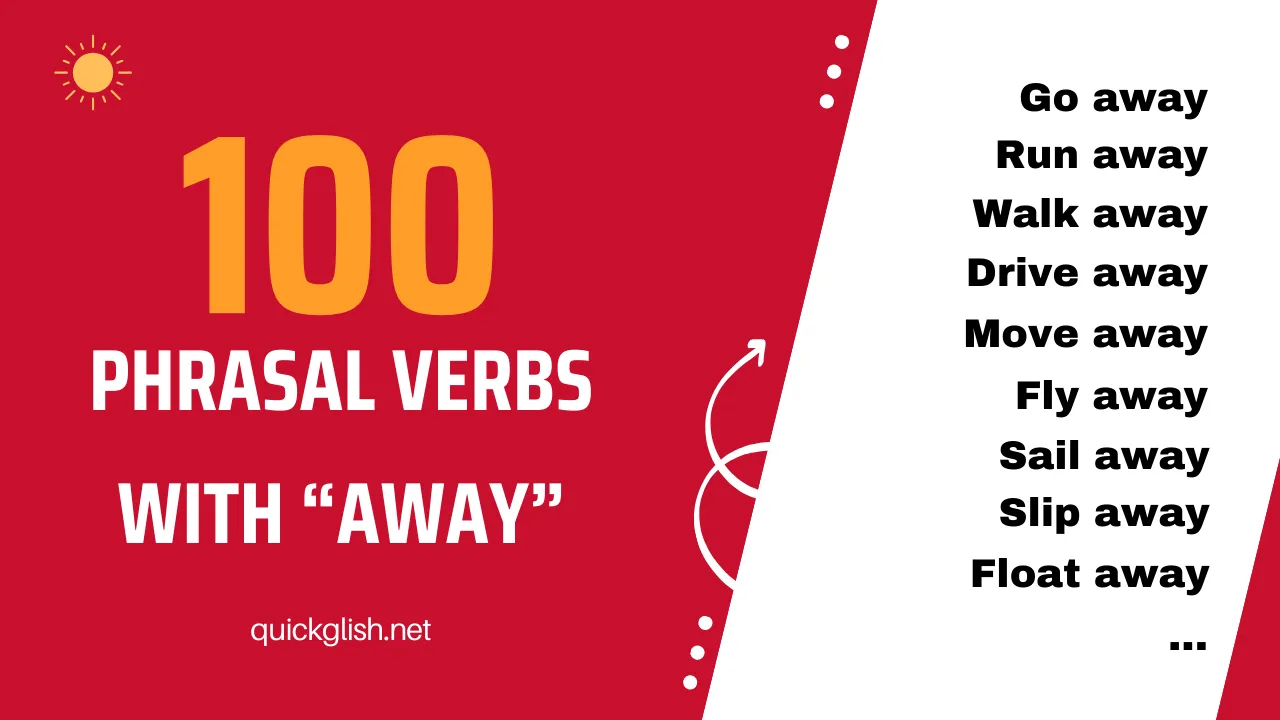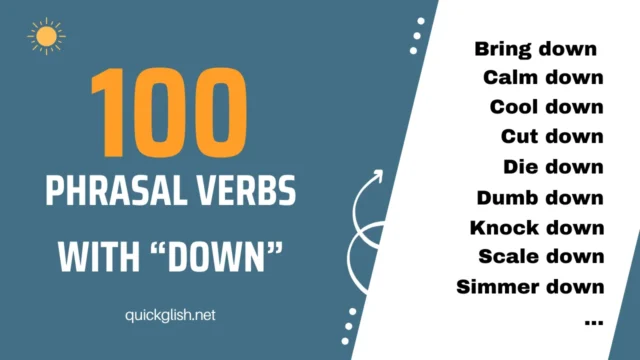Phrasal verbs combine a verb with a particle to create meanings that often differ from the original verb alone. The particle “away” typically indicates movement to a distance, departure, continuous action, or removal.

This collection of 100 phrasal verbs with “away” will help you enhance your English vocabulary and communicate more naturally.
Movement and distance
Go away:
To leave a place.
“The tourists went away after spending a week in the city.”
Run away:
To escape by running; to flee.
“The thief ran away when the alarm sounded.”
Walk away:
To leave a place or situation by walking.
“She walked away from the argument before saying something she’d regret.”
Drive away:
To leave in a vehicle; to cause to leave.
“They drove away in their new car.”
Move away:
To change residence to a different location.
“They moved away from the city to the countryside.”
Fly away:
To depart by air.
“The birds flew away when we approached.”
Sail away:
To depart by boat.
“The cruise ship sailed away from the harbor at sunset.”
Slip away:
To leave quietly or unnoticed.
“He slipped away from the party without saying goodbye.”
Float away:
To be carried away by water or air.
“The balloon floated away into the sky.”
Drift away:
To move gradually away, often without direction.
“The boat drifted away from the shore.”
Dismissal and rejection
Turn away:
To refuse entry or service; to reject.
“The nightclub turned away people who weren’t properly dressed.”
Send away:
To order someone to leave; to request something by mail.
“The teacher sent away the disruptive student.”
Chase away:
To force to leave by pursuing.
“The dog chased away the squirrels in the yard.”
Shoo away:
To drive away, usually by waving hands.
“She shooed away the flies from the food.”
Wave away:
To dismiss or reject with a hand gesture.
“He waved away my concerns about the project.”
Brush away:
To dismiss or remove with a sweeping motion.
“She brushed away his objections and continued with her plan.”
Keep away:
To prevent from approaching or coming near.
“The sign warned people to keep away from the edge.”
Push away:
To physically move something to a distance; to emotionally reject.
“He pushed away the plate of food he didn’t like.”
Put away:
To place something where it belongs; to save or store.
“Put away your toys when you’ve finished playing.”
Throw away:
To discard or get rid of.
“Don’t throw away those old photos; they might be valuable someday.”
Continuous action
Work away:
To continue working steadily.
“She worked away at her desk all afternoon.”
Chip away:
To gradually reduce or remove something.
“He’s been chipping away at his debt for years.”
Plug away:
To persist with something difficult or tedious.
“He plugged away at the complex math problem.”
Hammer away:
To strike repeatedly; to work persistently.
“The construction crew hammered away all day.”
Type away:
To continuously type for a period.
“She was typing away on her laptop in the coffee shop.”
Tap away:
To hit lightly and repeatedly.
“He was tapping away at the keyboard.”
Nibble away:
To gradually consume or reduce.
“Inflation has been nibbling away at our savings.”
Peck away:
To strike repeatedly with something pointed; to work at something bit by bit.
“The woodpecker pecked away at the tree trunk.”
Whittle away:
To gradually reduce or remove.
“The negotiations whittled away at the initial disagreements.”
Eat away:
To gradually destroy or consume.
“Acid rain eats away at limestone buildings.”
Disappearance and removal
Fade away:
To gradually disappear or become less distinct.
“The music faded away as we walked further from the concert.”
Melt away:
To disappear gradually, like snow melting.
“My anxiety melted away once I knew I had passed the exam.”
Wash away:
To remove or carry off by the action of water.
“The rain washed away the chalk drawings on the sidewalk.”
Blow away:
To be carried off by wind; to impress greatly.
“The storm blew away the beach umbrellas.”
Clear away:
To remove things to create a clean or empty space.
“Please clear away the dishes after dinner.”
Give away:
To donate, reveal, or transfer ownership.
“She gave away all her old clothes to charity.”
Wear away:
To gradually diminish through use or friction.
“The steps had worn away from years of footsteps.”
Wipe away:
To remove by wiping.
“She wiped away her tears and smiled bravely.”
Strip away:
To remove a covering or layer.
“The investigators stripped away the layers of deception.”
Tear away:
To remove forcefully; to leave reluctantly.
“It was hard to tear away from the beautiful beach.”
Wasting and squandering
Throw away:
To waste or squander.
“They threw away their chance at winning by not preparing properly.”
Fritter away:
To waste time, money, or resources on unimportant things.
“He frittered away his inheritance on luxury items.”
Toss away:
To dispose of carelessly; to waste.
“Don’t toss away your opportunity for education.”
Give away:
To lose or surrender.
“The team gave away their lead in the final quarter.”
Gamble away:
To lose by gambling.
“He gambled away his entire paycheck.”
Drink away:
To spend money on alcohol; to waste time drinking.
“He drank away his sorrows after losing his job.”
Idle away:
To spend time doing nothing productive.
“They idled away the summer afternoons by the pool.”
Piss away:
(vulgar) To waste resources foolishly.
“He pissed away his talents by never applying himself.”
Squander away:
To waste resources foolishly.
“The company squandered away its investors’ money on unnecessary expenses.”
While away:
To pass time in a relaxed way, often during waiting.
“She whiled away the hours reading while waiting for her flight.”
Hiding and concealment
Hide away:
To conceal oneself or something.
“He hid away the presents before the children came home.”
Tuck away:
To put in a safe or hidden place.
“She tucked away some money for emergencies.”
Stash away:
To store secretly.
“He stashed away some chocolates for later.”
Lock away:
To secure something by locking.
“The valuable jewelry was locked away in the safe.”
File away:
To store for future reference.
“I filed away that information for later use.”
Stow away:
To hide oneself on a vehicle to obtain free passage.
“The teenager stowed away on the cargo ship to escape his homeland.”
Pack away:
To place in storage.
“We packed away the winter clothes when summer arrived.”
Store away:
To keep for future use.
“Squirrels store away nuts for the winter.”
Bottle away:
To keep feelings suppressed.
“He bottled away his grief rather than expressing it.”
Spirit away:
To take someone away secretly or mysteriously.
“The child was spirited away in the middle of the night.”
Time and distance
Far away:
To be distant in space or time.
“Those events happened so far away in the past.”
Long away:
To be absent for an extended period.
“He’s been long away on his business trip.”
Right away:
To do something immediately.
“Please come right away; it’s an emergency.”
Straight away:
To do something immediately or directly.
“I knew straight away that something was wrong.”
Miles away:
To be distracted or not paying attention.
“Sorry, I didn’t hear you. My thoughts were miles away.”
Years away:
To be distant in time.
“Retirement seems years away when you’re young.”
Days away:
To be imminent but not immediate.
“The wedding is just days away now.”
Hours away:
To be relatively close in time, but not immediate.
“Relief is just hours away when the medication starts working.”
Minutes away:
To be very close in time or distance. “
The hospital is just minutes away from our house.”
Seconds away:
To be extremely close in time.
“We’re just seconds away from the New Year countdown.”
Achievement and progress
Break away:
To separate from a group; to escape restraint.
“The cyclist broke away from the pack and took the lead.”
Pull away:
To move ahead of competitors; to become detached.
“Their company has pulled away from the competition in recent years.”
Race away:
To leave quickly; to move faster than others.
“The horse raced away from the others and won by several lengths.”
Forge ahead/away:
To make progress despite difficulties.
“Despite setbacks, the team forged away with their plans.”
Power away:
To move with great force or speed.
“The runner powered away from the others in the final stretch.”
Shoot away:
To depart suddenly and rapidly.
“After the meeting, he shot away to catch his train.”
Surge away:
To move forward suddenly and powerfully.
“The home team surged away in the second half of the game.”
Blast away:
To move very quickly or forcefully.
“The speedboat blasted away from the dock.”
Edge away:
To gradually increase a lead or advantage.
“Our company has been edging away from competitors in market share.”
Pull away:
To gradually establish a lead.
“The front-runner pulled away from the pack in the final lap.”
Emotional reactions
Laugh away:
To dismiss with laughter; to eliminate by laughing.
“He laughed away my concerns, saying I was being too cautious.”
Smile away:
To dispel by smiling.
“She smiled away the awkward moment and changed the subject.”
Talk away:
To eliminate through discussion.
“They talked away their differences over dinner.”
Charm away:
To remove or alleviate through charm.
“He charmed away her anger with his sincere apology.”
Scare away:
To cause to leave by frightening.
“The loud noise scared away the birds.”
Frighten away:
To cause to flee by inducing fear.
“The dog’s barking frightened away the intruder.”
Dream away:
To spend time in fantasy or reverie.
“She dreamed away the afternoon instead of studying.”
Cry away:
To eliminate or reduce by crying.
“She cried away her sorrows after the breakup.”
Dance away:
To eliminate or pass time by dancing.
“They danced away the night at the wedding reception.”
Sing away:
To eliminate or pass time by singing.
“The choir sang away the tension with their beautiful melodies.”
Miscellaneous useful phrasal verbs
Get away:
To escape; to go on vacation.
“We’re planning to get away for the weekend.”
Do away with:
To eliminate or abolish.
“The new policy does away with the need for paper forms.”
Pass away:
A euphemism for dying.
“His grandfather passed away peacefully in his sleep.”
Fall away:
To gradually decrease or disappear.
“Support for the proposal fell away after the cost became known.”
Fire away:
To begin asking questions or speaking.
“If you have questions, fire away!”
Give away:
To reveal or expose.
“His nervous laugh gave away the fact that he was lying.”
Look away:
To turn one’s gaze elsewhere.
“She looked away when they showed the graphic scene in the movie.”
Carry away:
To transport emotionally; to take without permission.
“Don’t get carried away with excitement about the job offer until it’s official.”
Explain away:
To dismiss or minimize the importance of something by explanation.
“He tried to explain away his poor performance by blaming his tools.”
Take away:
To remove; to learn as a conclusion; food ordered to be eaten elsewhere.
“What did you take away from the lecture today?”
Mastering phrasal verbs with “away” will significantly enhance your English fluency and comprehension. These versatile expressions are common in everyday conversations, literature, and media. The best way to learn them is to practice using them in context regularly.
Remember that many phrasal verbs have multiple meanings depending on their context, so pay attention to how they’re used in different situations. With consistent practice, you’ll find yourself naturally incorporating these phrasal verbs into your English communication, making your speech and writing more authentic and expressive.






